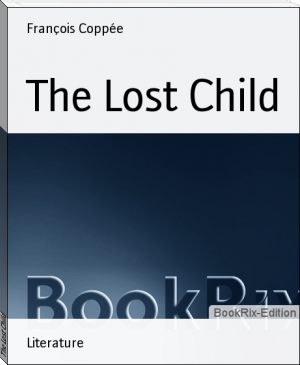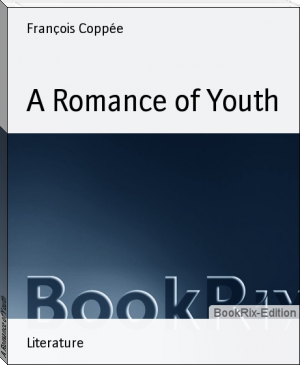International Short Stories: French - - (new books to read .TXT) 📗

- Author: -
- Performer: -
Book online «International Short Stories: French - - (new books to read .TXT) 📗». Author -
“It’s you, Gourdon,” he said to me at last, in a feeble voice; “is the battle won?”
“I think so, colonel,” I answered him.
There was a moment of silence. Then, opening his eyes and looking at me, he inquired—
“Where are you wounded?”
“In the shoulder—and you, colonel?”
“My elbow must be smashed. I remember; it was the same bullet that arranged us both like this, my boy.”
He made an effort to sit up.
“But come,” he said with sudden gaiety, “we are not going to sleep here?”
You cannot believe how much this courageous display of joviality contributed towards giving me strength and hope. I felt quite different since we were two to struggle against death.
“Wait,” I exclaimed, “I will bandage up your arm with my handkerchief, and we will try and support one another as far as the nearest ambulance.”
“That’s it, my boy. Don’t make it too tight. Now, let us take each other by the good hand and try to get up.”
We rose staggering. We had lost a great deal of blood; our heads were swimming and our legs failed us. Any one would have mistaken us for drunkards, stumbling, supporting, pushing one another, and making zigzags to avoid the dead. The sun was setting with a rosy blush, and our gigantic shadows danced in a strange way over the field of battle. It was the end of a fine day.
The colonel joked; his lips were crisped by shudders, his laughter resembled sobs. I could see that we were going to fall down in some corner never to rise again. At times we were seized with giddiness, and were obliged to stop and close our eyes. The ambulances formed small grey patches on the dark ground at the extremity of the plain.
We knocked up against a large stone, and were thrown down one on the other. The colonel swore like a pagan. We tried to walk on all-fours, catching hold of the briars. In this way we did a hundred yards on our knees. But our knees were bleeding.
“I have had enough of it,” said the colonel, lying down; “they may come and fetch me if they will. Let us sleep.”
I still had the strength to sit half up, and shout with all the breath that remained within me. Men were passing along in the distance picking up the wounded; they ran to us and placed us side by side on a stretcher.
“Comrade,” the colonel said to me during the journey, “Death will not have us. I owe you my life; I will pay my debt, whenever you have need of me. Give me your hand.”
I placed my hand in his, and it was thus that we reached the ambulances. They had lighted torches; the surgeons were cutting and sawing, amidst frightful yells; a sickly smell came from the blood-stained linen, whilst the torches cast dark rosy flakes into the basins.
The colonel bore the amputation of his arm with courage; I only saw his lips turn pale and a film come over his eyes. When it was my turn, a surgeon examined my shoulder.
“A shell did that for you,” he said; “an inch lower and your shoulder would have been carried away. The flesh, only, has suffered.”
And when I asked the assistant, who was dressing my wound, whether it was serious, he answered me with a laugh:
“Serious! you will have to keep to your bed for three weeks, and make new blood.”
I turned my face to the wall, not wishing to show my tears. And with my heart’s eyes I perceived Babet and my uncle Lazare stretching out their arms towards me. I had finished with the sanguinary struggles of my summer day.
III AUTUMNIt was nearly fifteen years since I had married Babet In my uncle Lazare’s little church. We had sought happiness in our dear valley. I had made myself a farmer; the Durance, my first sweetheart, was now a good mother to me, who seemed to take pleasure in making my fields rich and fertile. Little by little, by following the new methods of agriculture, I became one of the wealthiest landowners in the neighbourhood.
We had purchased the oak-tree walk and the meadows bordering on the river, at the death of my wife’s parents. I had had a modest house built on this land, but we were soon obliged to enlarge it; each year I found a means of rounding off our property by the addition of some neighbouring field, and our granaries were too small for our harvests.
Those first fifteen years were uneventful and happy. They passed away in serene joy, and all they have left within me is the remembrance of calm and continued happiness. My uncle Lazare, on retiring to our home, had realised his dream; his advanced age did not permit of his reading his breviary of a morning; he sometimes regretted his dear church, but consoled himself by visiting the young vicar who had succeeded him. He came down from the little room he occupied at sunrise, and often accompanied me to the fields, enjoying himself in the open air, and finding a second youth amidst the healthy atmosphere of the country.
One sadness alone made us sometimes sigh. Amidst the fruitfulness by which we were surrounded, Babet remained childless. Although we were three to love one another we sometimes found ourselves too much alone; we would have liked to have had a little fair head running about amongst us, who would have tormented and caressed us.
Uncle Lazare had a frightful dread of dying before he was a great-uncle. He had become a child again, and felt sorrowful that Babet did not give him a comrade who would have played with him. On the day when my wife confided to us with hesitation, that we would no doubt soon be four, I saw my uncle turn quite pale, and make efforts not to cry. He kissed us, thinking already of the christening, and speaking of the child as if it were already three or four years old.
And the months passed in concentrated tenderness. We talked together in subdued voices, awaiting some one. I no longer loved Babet: I worshipped her with joined hands; I worshipped her for two, for herself and the little one.
The great day was drawing nigh. I had brought a midwife from Grenoble who never moved from the farm. My uncle was in a dreadful fright; he understood nothing about such things; he went so far as to tell me that he had done wrong in taking holy orders, and that he was very sorry he was not a doctor.
One morning in September, at about six o’clock, I went into the room of my dear Babet, who was still asleep. Her smiling face was peacefully reposing on the white linen pillow-case. I bent over her, holding my breath. Heaven had blessed me with the good things of this world. I all at once thought of that summer day when I was moaning in the dust, and at the same time I felt around me the comfort due to labour and the quietude that comes from happiness. My good wife was asleep, all rosy, in the middle of her great bed; whilst the whole room recalled to me our fifteen years of tender affection.
I kissed Babet softly on the lips. She opened her eyes and smiled at me without speaking. I felt an almost uncontrollable desire to take her in my arms, and clasp her to my heart; but, latterly, I had hardly dared press her hand, she seemed so fragile and sacred to me.
I seated myself at the edge of the bed, and asked her in a low voice:
“Is it for to-day?”
“No, I don’t think so,” she replied. “I dreamt I had a boy: he was already very tall and wore adorable little black moustachios. Uncle Lazare told me yesterday that he also had seen him in a dream.”
I acted very stupidly.
“I know the child better than you do,” I said. “I see it every night. It’s a girl——”
And as Babet turned her face to the wall, ready to cry, I realised how foolish I had been, and hastened to add:
“When I say a girl—I am not quite sure. I see a very small child with a long white gown.—it’s certainly a boy.”
Babet kissed me for that pleasing remark.
“Go and look after the vintage,” she continued, “I feel calm this morning.”
“You will send for me if anything happens?”
“Yes, yes, I am very tired: I shall go to sleep again. You’ll not be angry with me for my laziness?”
And Babet closed her eyes, looking languid and affected. I remained leaning over her, receiving the warm breath from her lips in my face. She gradually went off to sleep, without ceasing to smile. Then I disengaged my hand from hers with a multitude of precautions. I had to manoeuvre for five minutes to bring this delicate task to a happy issue. After that I gave her a kiss on her forehead, which she did not feel, and withdrew with a palpitating heart, overflowing with love.
In the courtyard below, I found my uncle Lazare, who was gazing anxiously at the window of Babet’s room. So soon as he perceived me he inquired:
“Well, is it for to-day?”
He had been putting this question to me regularly every morning for the past month.
“It appears not,” I answered him. “Will you come with me and see them picking the grapes?”
He fetched his stick, and we went down the oak-tree walk. When we were at the end of it, on that terrace which overlooks the Durance, both of us stopped, gazing at the valley.
Small white clouds floated in the pale sky. The sun was shedding soft rays, which cast a sort of gold dust over the country, the yellow expanse of which spread out all ripe. One saw neither the brilliant light nor the dark shadows of summer. The foliage gilded the black earth in large patches. The river ran more slowly, weary at the task of having rendered the fields fruitful for a season. And the valley remained calm and strong. It already wore the first furrows of winter, but it preserved within it the warmth of its last labour, displaying its robust charms, free from the weeds of spring, more majestically beautiful, like that second youth, of woman who has given birth to life.
My uncle Lazare remained silent; then, turning towards me, said:
“Do you remember, Jean? It is more than twenty years ago since I brought you here early one May morning. On that particular day I showed you the valley full of feverish activity, labouring for the fruits of autumn. Look; the valley has just performed its task again.”
“I remember, dear uncle,” I replied. “I was quaking with fear on that day; but you were good, and your lesson was convincing. I owe you all my happiness.”
“Yes, you have reached the autumn. You have laboured and are gathering in the harvest. Man, my boy, was created after the way of the earth. And we, like the common mother, are eternal: the green leaves are born again each year from dry leaves; I am born again in you, and you will be born again in your children. I am telling you this so that old age may not alarm you, so that you may know how to die in peace, as dies this verdure, which will shoot out again from its own germs next spring.”
I listened to my uncle and thought of Babet, who was sleeping in her great bed spread with white linen. The dear creature was about to give birth to a child after the manner of this fertile soil which had given us fortune. She also had reached the autumn: she had the beaming smile and serene robustness of the valley. I seemed





Comments (0)